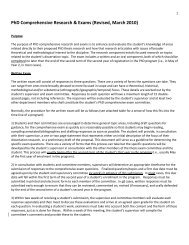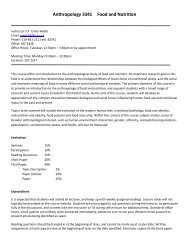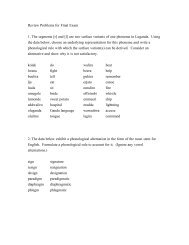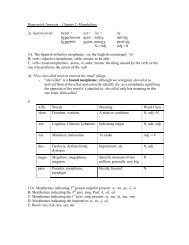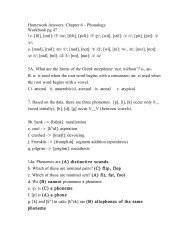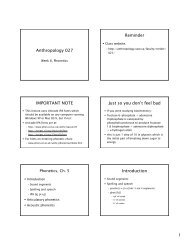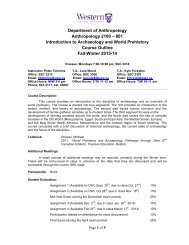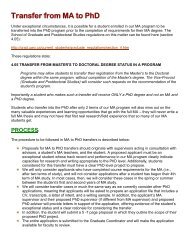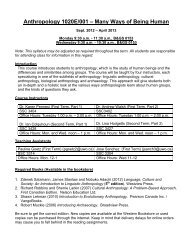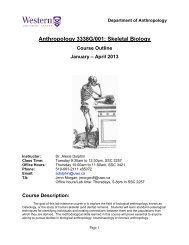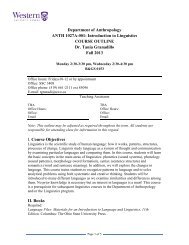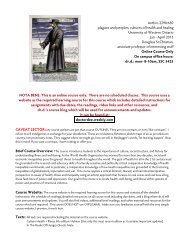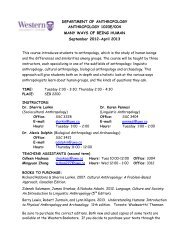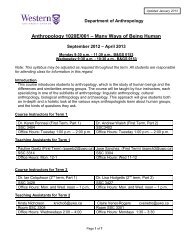Lecture notes for Ch. 7 (L1 Acquisition) - Anthropology
Lecture notes for Ch. 7 (L1 Acquisition) - Anthropology
Lecture notes for Ch. 7 (L1 Acquisition) - Anthropology
You also want an ePaper? Increase the reach of your titles
YUMPU automatically turns print PDFs into web optimized ePapers that Google loves.
<strong>Anthropology</strong> 027<br />
Language acquisition<br />
Final Exam<br />
• Date: Tues, April 22<br />
• Time: 7pm<br />
• Where: SSC, Rm 2036<br />
• <strong>L1</strong> acquisition<br />
• Stages<br />
• Theories<br />
Overview<br />
Studying lg development<br />
• Naturalistic approach<br />
• observation<br />
• diary study<br />
• sampling over time<br />
Studying lg development II<br />
• Experimental approach<br />
• comprehension<br />
− give children toys & ask them to enact s.t., e.g.<br />
“the lion was hit by the elephant”<br />
• production<br />
− child shown a picture & asked to describe it<br />
• imitation<br />
− since child resists correction, can say s.t. & ask<br />
child to repeat it<br />
• Phonology<br />
• Grammar<br />
• Lexicon<br />
Subsystems acquired<br />
1
<strong>Acquisition</strong> of Phonology<br />
• Early phonetic processes are simplifying<br />
• substitutions<br />
− bag -> pak<br />
− ke -> ti<br />
− lamb -> nam<br />
− thick -> fik<br />
<strong>Acquisition</strong> of Phonology II<br />
• simplifications cont’d<br />
• deletions<br />
− stop -> top<br />
− play -> pay<br />
− cat -> ca<br />
• additions<br />
− blue -> b@lu<br />
− pig -> pig@<br />
<strong>Acquisition</strong> of Phonology III<br />
• Developmental order (Jakobson,<br />
Kindersprache)<br />
• /p, t, m, a/<br />
•/a, i/<br />
• /f, th, d, v, .../<br />
• /i, e, a/ or /i, u, a/<br />
• /n, m, .../<br />
•/l, r/<br />
Stages of <strong>L1</strong> <strong>Acquisition</strong><br />
• Babbling<br />
• One-word<br />
•Two-word<br />
• Telegraphic speech<br />
<strong>L1</strong> Grammar <strong>Acquisition</strong><br />
• One-word stage (holophrastic utterances)<br />
• concrete nouns & verbs<br />
• later adjs<br />
• naming comes first, then asking<br />
• sequences of one-word utterances:<br />
− “Car. Go. Bus” = ‘hearing that car reminds me that<br />
we went on a bus yesterday’<br />
<strong>L1</strong> Grammar <strong>Acquisition</strong> cont’d<br />
• Two-word stage (topic-comment)<br />
• identification (see doggie)<br />
• repetition (more milk)<br />
• nonexistence (all gone candy)<br />
• negation (not wolf)<br />
• location (book there)<br />
• possession (my candy)<br />
• attribution (little doggy)<br />
2
<strong>L1</strong> Grammar <strong>Acquisition</strong> cont’d<br />
• Two-word stage (topic-comment)<br />
• question (where ball?)<br />
• agent-action (Mommy push)<br />
• agent-object (Mommy [cuts a] pumpkin)<br />
• action-location (sit chair)<br />
• action-DO (cut pumpkin)<br />
• action-IO (give Papa)<br />
• action-Instrument (cut [with a] knife)<br />
<strong>L1</strong> Grammar <strong>Acquisition</strong> cont’d<br />
• Telegraphic speech<br />
• no specifically three-word stage<br />
• functions words, inflections missing so like a<br />
telegram (‘Cat stand on table’, ‘what that?’)<br />
• semantic roles expressed with word order<br />
(‘Jamie was followed by the dog’ has Jamie<br />
as actor)<br />
<strong>L1</strong> Grammar <strong>Acquisition</strong> cont’d<br />
• Inflections gradually added<br />
• possession, tense, case, number, etc.<br />
• most regular ones learned first<br />
− -ing be<strong>for</strong>e 3rd sg. -s<br />
− -s be<strong>for</strong>e -ed (present be<strong>for</strong>e past)<br />
• overgeneralization<br />
− geeses<br />
− feets<br />
− randed (<strong>for</strong> ‘ran’)<br />
<strong>L1</strong> Grammar <strong>Acquisition</strong> cont’d<br />
• Inflections cont’d<br />
• suffixes precede prefixes<br />
• neg of existence be<strong>for</strong>e neg of rejection<br />
be<strong>for</strong>e neg of denial<br />
• present be<strong>for</strong>e past be<strong>for</strong>e future<br />
• counterfactuals, conditionals late<br />
• case agreement be<strong>for</strong>e gender agreement<br />
Lexical, semantic acquisition<br />
• nouns predominate in early stages<br />
• speed astounding: 10-12 words/day<br />
• location, direction expressions be<strong>for</strong>e<br />
temporal ones<br />
• deictic spatial terms (in front of, behind)<br />
after non-deictic ones (in, on)<br />
Lexical acquisition cont’d<br />
• Antonymous adjectives -- unmarked<br />
member is first:<br />
• big < small thick < thin<br />
• tall < short wide < narrow<br />
• long < short deep < shallow<br />
• high < low<br />
3
Lexical acquisition cont’d<br />
• Meaning of unmarked member extended<br />
to marked member:<br />
• asking 3-5 y/o’s to point to tree with ‘less’<br />
apples, they point to tree with ‘more’<br />
Lexical acquisition cont’d<br />
• The story of be<strong>for</strong>e/after (4 stages)<br />
• She jumped over the gate be<strong>for</strong>e she patted<br />
the dog<br />
• Be<strong>for</strong>e she patted the dog, she jumped ...<br />
• After she jumped over the gate, she patted ...<br />
• She patted the dog after she jumped ...<br />
Lexical acquisition cont’d<br />
• Stage 1 -- iconic word order<br />
• clause 1 event be<strong>for</strong>e clause 2 event<br />
• State 2 -- split of ‘be<strong>for</strong>e’ / ‘after’<br />
• ‘be<strong>for</strong>e’ Ss correct, ‘after’ Ss iconic<br />
Lexical acquisition cont’d<br />
• State 3 -- spread of ‘be<strong>for</strong>e’ meaning to<br />
‘after<br />
• both ‘after’ Ss wrong<br />
• Stage 4 -- all 4 Ss correct<br />
Theories of <strong>L1</strong> <strong>Acquisition</strong><br />
• Vygotsky: egocentric (talking to self) speech is<br />
crucial to development of general cognitive<br />
abilities<br />
• Piaget: cognitive development precedes &<br />
shapes lg acquisition<br />
• <strong>Ch</strong>omsky: lg development is entirely innate & lg<br />
specific<br />
Theories of <strong>L1</strong> <strong>Acquisition</strong> II<br />
• For innatist position:<br />
• lg emerges be<strong>for</strong>e it is needed (parents still feeding)<br />
• there is a ‘critical period’<br />
• direct learning and practice have little effect<br />
• there is a regular sequence of stages<br />
• child ‘knows’ many things it has never heard’<br />
• Against innatist position<br />
• critical period only holds true <strong>for</strong> accent/phonology<br />
• this not different from acquisition of other fine motor<br />
skills, e.g. violin playing<br />
4
Stefan by E.K. Page<br />
Stefan<br />
aged eleven<br />
looked at the baby and said<br />
When he thinks it must be pure thought<br />
because he hasn’t any words yet<br />
Stefan by E.K. Page<br />
and we<br />
pround parents<br />
admiring friends<br />
who had looked at the baby<br />
looked at the baby again<br />
5



